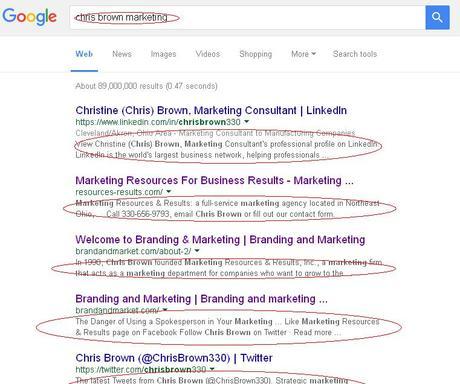If you are a marketing professional in charge of the branding and marketing messages for your company, you're probably acutely aware what your meta description says about your company.
You probably argued various versions with the "powers that be" and cajoled them into selecting a message that resonates with clear, compelling and memorable words.
Not sure what I'm talking about? Uh-Oh! Better go "google" a key phrase for your business and take a look.
Below is a screen capture of some meta descriptions. I've googled the phrase "chris brown marketing" and circled the meta descriptions in red to show you what I mean.

I'm talking about the 2 lines of copy that describes the webpage that was returned in the search results.
It's the verbage that people read to decide if they should click on it or not.
I've also found that it can be very revealing for marketing positioning and when starting a online competitive review for a new client, I often start with a quick look at the competitor's meta descriptions.
Don't get me wrong. The title shown in blue, is very VERY important. You've probably set it up as the main keywords for your business... and for your business website, it's probably your business name. But the title beyond the title is the meta description.
For the home page of a company it's often what you'd want people to think and say about your company. Certainly what you'd want to tell them to get them to come visit your website.
Usually they only see these words when they search for information. But if you don't conscientiously add a meta description, it automatically picks up the first 70 characters or so of the content on that page.
I recently tried it for "universities in Ohio" in preparation for a speech, I will be giving about creating positioning in branding for universities.
As you know, It's a very difficult task to change the branding of a university. Alumni have strong feelings. Current students and faculty do too. And it's often the potential students and their parents that are most strongly considered when the goal is to increase enrollment. However if the goal is to increase donations to improve the endowment, the positioning may be different.
Take a look at this 2 page PDF of the meta descriptions from universities in Ohio. Many of the descriptions are what you would expect, however as a marketer, I find it eye opening.
- the use of the word "best" or "top"
- Did one university forget completely about the meta description being a key online marketing media... and let the programmer write the description?
- Maybe the cheering squad at the football game wrote one of the descriptions?
- the role one university will play in about 12 months in the USA political election?
- One university's focus is the jobs it brings to their region
I've said it before. You can try to create your own brand positioning... but if you're off target, you'll find that the public will create the position without you. It's hard to know what to keep and what to throw out.
So if you are a branding and marketing professional, your mini marketing homework for today is to check out your company's meta description. Is that what you want it to say? Does it speak to existing employees? Potential customers? Or was it written by the programmer and says something like "don't forget to enter the meta description here." (Don't laugh, I've seen something similar!)

